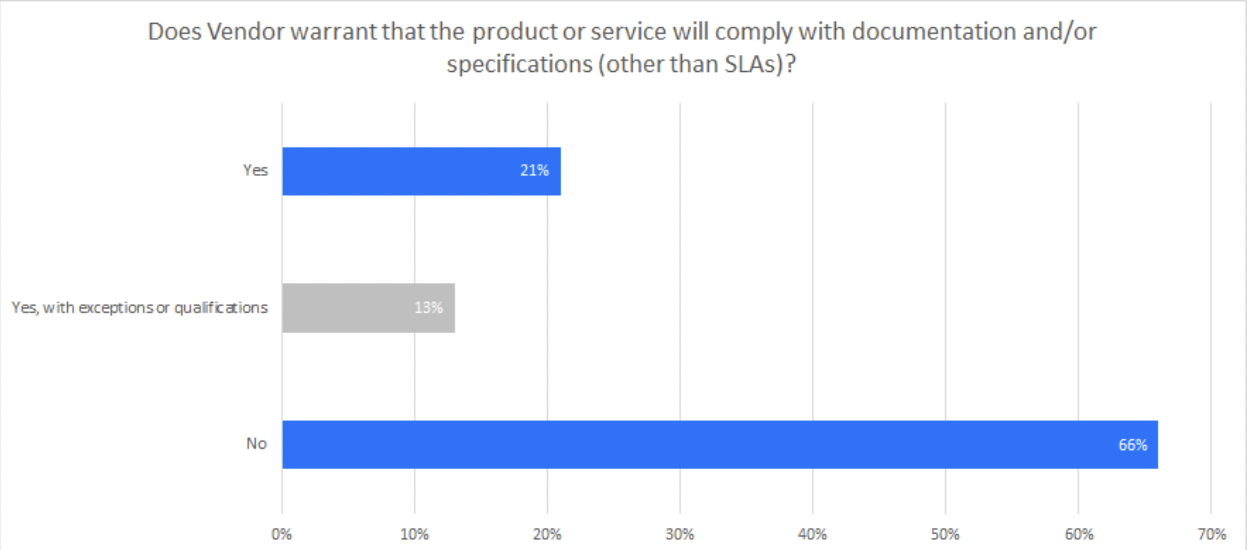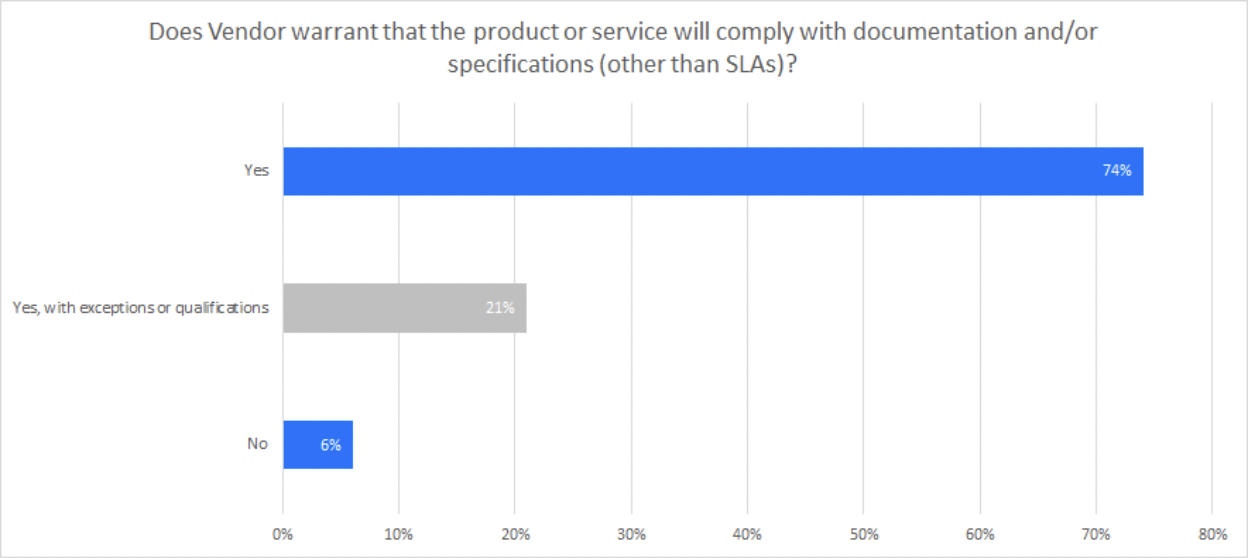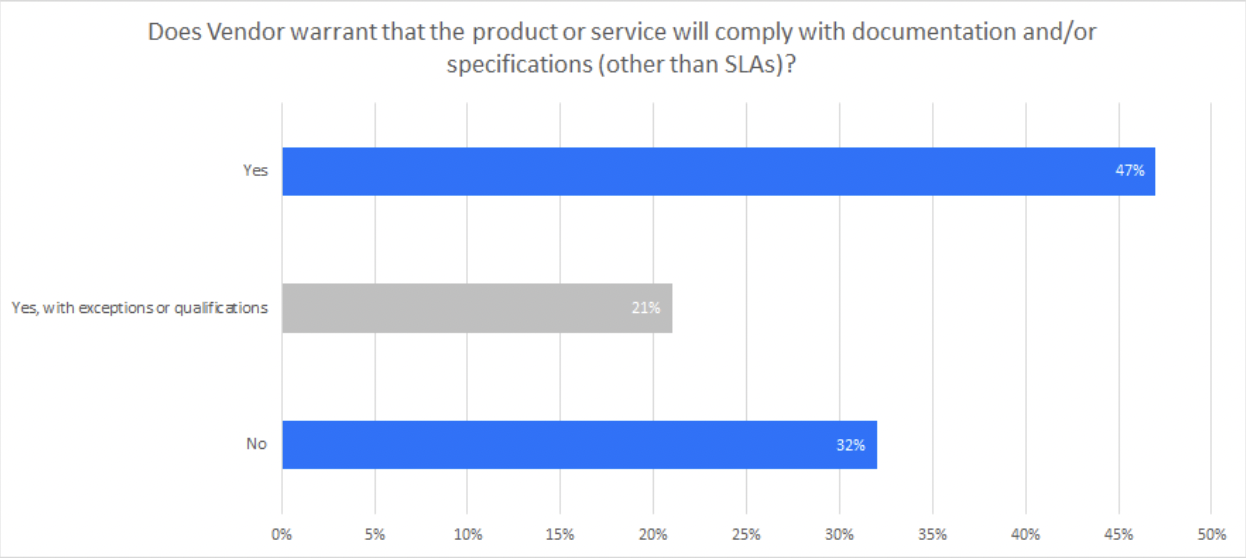The What’s Market Series is an ongoing deep dive into contract terms, with supporting data demonstrating how often such terms are seen in vendor forms, customer forms, and negotiated contracts. All data is gathered by TermScout, which uses AI assisted by contract professionals to accurately review and rate contracts.
In this article we examine how common it is for vendors to warrant that their products or services will comply with documentation or specifications.
Warranties Overview
Within contracts, vendor warranties serve as a promise from the vendor to the customer. As defined by UpCounsel, “A warranty in contract law is a promise or guarantee from one party to another that the facts are true and reliable. A contractual warranty is an obligation that the facts that relate to the subject of the contract are true. In the case that those facts ever become untrue, the warranty is also a protection to the recipient to cover any losses that may arise.” This definition illuminates the notion that warranties are a double-edged sword: they help to induce contract assent, but breach of the same warranties can result in liability for the vendor.
One of the most common warranties in IT contracts is a warranty that the products or services will comply with documentation or specifications. For the purposes of this article, Service Level Agreements (SLAs) will not be included, as they are tracked outside of the generalized documentation or specifications.
Many vendors will avoid offering this warranty, or will carve out exceptions, such as excluding liability if the breach is caused by misuse of the software or by breach of contract by the customer. In situations where the vendor provides a warranty, and it is breached, it is the vendor who then must pay for any losses that the customer may incur. Therefore, it is important to carefully read through contracts to identify what is covered by this warranty. While everyone hopes to avoid the worst-case scenario, it is best to know who will be financially liable in the event of a breach.
Warranty that the Products or Services will Comply with Applicable Documentation and/or Specifications
Vendor vs. Customer vs. Negotiated Contracts
When it comes to providing a guarantee that the product or service will comply with documentation or specifications, each party has a competing position. Vendors generally don’t want to provide a warranty guaranteeing that their products or services will comply with documentation or specifications, while customers prefer the assurance that a warranty provides. To help illustrate the difference in mindset, TermScout reviewed 586 vendor forms, 101 customer forms, and 90 negotiated contracts to provide a breakdown of how often vendors do provide this warranty.
What Vendors Offer (586)

As seen in the above graph, vendors overwhelmingly do not warrant that their product will adhere to documentation or specifications. While it is logical that customers would expect a product or service to function as promised, it is also logical that vendors want to avoid liability, which is why more than 65% of vendors are not willing to offer this as a starting position.
Customer Forms (101)

In quite the departure from the previous data, we can see that customers care greatly about this warranty, with 95% of customers asking for it. Now, let’s look at the data from contracts where negotiations between these two opposing sides have been completed.
Negotiated Contracts (90)

This data set shows us the power of negotiation. We now see that there are situations where a vendor is willing to provide this warranty – oftentimes with conditions or qualifications – as it is offered in over 65% of negotiated contracts. This is far greater than the sum previously seen in vendor forms, where the combined percentage of vendors offering this warranty was a mere 34%. We can safely take away that vendors, while unlikely to give this warranty off the bat, are willing to negotiate.
Representative Provisions*
Examples of Companies where Vendor provides this warranty
- BambooHR: 9.1, Terms of Service
- DocuSign: 8.1, Master Services Agreement
- Microsoft Azure: 4(a)(ii), Online Subscription Agreement
- NetSuite: 3.1, Terms of Service
- Snowflake: 8.1, Terms of Service
Examples of Companies where the vendor provides this warranty, with exceptions or qualifications
- AdvancedMD: 6.2(a), Terms of Service
- DataRobot: 14.1, Master Subscription Agreement
- Freshworks: 8a, Master Services Agreement
- iCIMS: 9.1, Subscription Agreement
- Snaplogic: 6.1, Master Subscription Agreement
- Trend Micro: 7.1, Terms of Service
*Examples of companies that do not provide this warranty have been excluded from this list, as in almost all cases where this is true, it is due to the contract not addressing warranties, rather than explicitly denying them.
Final Thoughts
Whether a vendor provides a warranty for their product or service that assures it will adhere to documentation or specifications largely depends on negotiation. As we’ve seen, the majority of vendors do not provide this warranty from the get-go, but through negotiation many are willing to provide it, albeit often with exceptions or qualifications. From all of this we can take away a couple of things: first, this warranty is valuable to the customer and builds trust; and second, vendors may want to consider offering this warranty upfront to save time in the negotiation process.
The What’s Market Series will be published regularly, so keep an eye out for the next article, coming soon!
Share this
You May Also Like
These Related Stories

Vendor Indemnification Obligations: What’s Market in IT, SaaS, and PaaS Contracts
.jpg)
What’s Market: Customer’s Indemnification Obligations

.png?width=130&height=53&name=Vector%20(21).png)